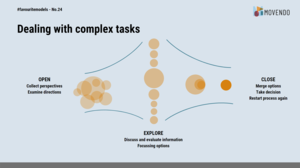#favouritemodel No. 24 - Dealing with complex tasks

And that solved the problem? Well, congratulations! Because this type of problem is becoming extinct. The problems that we can solve exclusively with the right expertise are becoming increasingly fewer. At the same time, there are more and more tasks with a degree of complexity for which we need several brains just to get a grasp. If I try to solve such complex problems with the "expert approach" - i.e., assuming that I only need the right knowledge or the right person with the appropriate knowledge, I will probably fail utterly. Most likely, my solution then targets only 1-2 aspects of the problem, while it actually has about 250. Which means that I ignored the complexity with this approach. Perhaps I have also consciously "reduced" it. This is a broadly used expression: “to reduce complexity”. But how effective is that? If I reduce an issue by some aspects in order to understand it better, these aspects do not disappear in reality. So I would have to add them again later, but would my solution then still be working? Most likely not.
So what do I need to be able to deal with complexity? Our first recommendation is: don't try to do it alone! Invite multiple perspectives to work through the problem with you. This can get quite confusing and feel overwhelming at first and very much not like a solution. At the same time, we are all so trimmed to finding a solution quickly. Yet this is what we have to endure! That the degree of complexity possibly even increases, because we allow different views on it, without already knowing in which direction the solution will be found. In the course of the process, we then agree what aspects we will be focusing on more and which ones we will put on the back burner. The hypotheses that guide us in this process should be reviewed again and again. We define parameters for the next decisions, knowing perfectly well that these are only the next steps that we are going to take and that the complete path to the goal is not yet known. After the initial decision for an action and its implementation, we observe closely and then enter the next reflection and learning loop. This iterative approach allows us to identify errors and unexpected effects quickly and integrate them into the next step towards a solution.
In our model, we describe the process of opening and "enduring" complexity as "open- explore - close".
At the outset, in the opening phase, the original complexity may even be increased, because I gather many perspectives and first examine the issue from different directions. The first challenge in the solution process is to filter out the relevant aspects and consciously put some aside - always keeping in mind that these could still become important in later stages. This is followed by the exploration phase, where information and parameters are explored, discussed and evaluated in order to make the subsequent decision. In the closing we condense them and define the next step, our action, which we observe closely in order to learn from it and go through the process all over again.
How does my #favouritemodel help you?
In our increasingly interconnected and interdependent world, we cannot escape from growing complexity. Ignoring it might relieve us, because we simply block out aspects from the picture, but it won’t solve the problem. And as one of my group of participants once so well remarked: "Complexity doesn't care whether you recognize it or not - it's just there!” So, let’s face it with all our diverse expertise, our different perspectives, experiences, feelings and thoughts and bring these to maximum unfoldment by:
- asking open questions that create space for new perspectives
- deliberately inviting counter-speech
- inviting more than one "expert"
- making information accessible and transparent to everyone
- never committing too quickly to one option
- planning smaller steps
- learning from the previous steps and rather inserting one more learning loop into the process
- always being prepared to be wrong
What experience have you gained in solving complex problems? What other ideas do you have for dealing with them?
Feel free to write me if you want to exchange ideas. By mail or on LinkedIn. You can find direct links to these channels in my profile.











